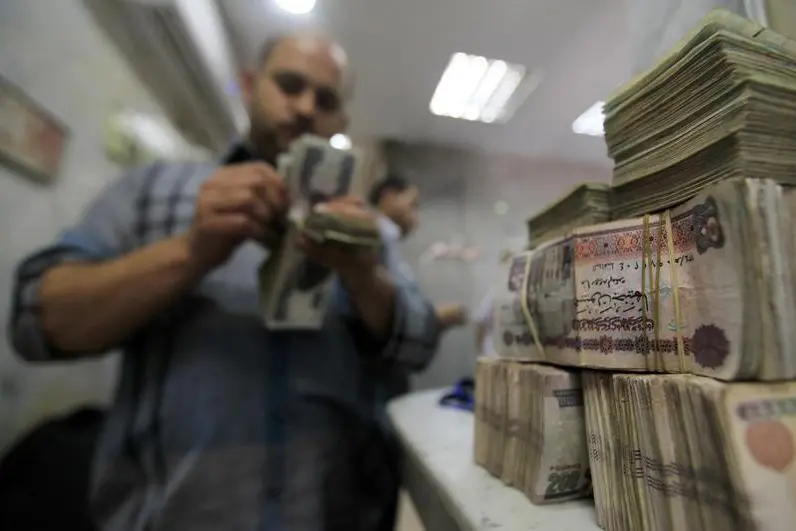PHOTO
Egypt has secured billions of dollars in investment commitments and loans, but the country's public finances are still severely strained and the next big challenge will be to focus on reforms.
Egypt recorded a budget deficit of EGP 186 billion (USD 24.4 billion) in the 2014/15 fiscal year that ended in February, an increase of 50% over the previous year's deficit, according to a ministry of finance report released in March.
A ministry official said the widening deficit was a result of steps taken to ensure greater social equality by introducing a minimum wage, increasing pensions, and higher spending on subsidies as well as boosting investment on infrastructure projects in the country.
The finance ministry said last March that it expects greater investment and fiscal reforms to shrink its budget deficit to 9.5-10% of gross domestic product in the 2015/16 fiscal year.
"The deficit in Egypt is a constant evil because it results from the inevitable expenditure on wages, debt servicing and interest payments, and subsidies, and whatever is left over goes to investment," said Sherif Kassem, a professor of Economics at Sadat Academy.
The finance ministry report showed that investment spending accounted for only 8% of total expenditure of EGP 385.2 billion during the July 2014 to February 2015 period, although it is up 31% when compared to investment spending in the previous fiscal year.
Wages and workers' compensations accounted for the largest chunk, or 33% of total government expenditure. Debt servicing costs made up 27% of overall expenses, while subsidies, grants and social benefits represented 20%.
The government of Abdel Fattah al-Sisi has clearly articulated its fiscal measures to be taken under its reform program and has moved on a number of fronts, including announcing cuts in energy subsidies.
Other revenue-earnings measures include a new capital gains and dividends tax rate, amendments to the property tax law, broadening the tax base by bringing some of the informal sector activities to the formal sector, excises on specific goods, including tobacco and alcoholic averages, and amendments to the mining law leading to higher fees and taxes.
"However, the concern rests on their sustainability, especially that much of the fiscal consolidation efforts so far rely on the subsidy bill, and that the introduction of the VAT has been postponed, while wages and salaries continue their double digit growth (17.4% y/y) given the existing civil service salary scale increases enshrined in the law," Barclays Capital said in a recent report.
LURING INVESTMENT
Mohamed Ashmawy, chairman and managing director of the United Bank of Egypt, believes investors will be eyeing the foreign exchange rate and tax segments, and looking at whether government spending is focused on investment in growth sectors that will stimulate economic growth.
The restoration of relative domestic political stability and a vastly improved investment climate coupled with lower commodity prices should help boost Egypt's economic fortunes. And the government is confident it can follow through on its policies and that improved confidence will accelerate foreign investment and boost economic growth.
A long-awaited draft law on investment, which aims to create a "one-stop shop" to make Egypt more attractive to foreign investors was announced at the investment conference, where Gulf states pledged USD 12.5 billion in loans and grants, and where investment deals worth USD 33 billion were secured.
Barclays Capital analyst Alia Moubayed said that foreign direct investment flows are likely to materialise only gradually, keeping pressure on the country's international reserves. It said that if the U.S. dollar strengthens in the second half of 2015, then the Central Bank of Egypt may allow the Egyptian pound to depreciate further in the third quarter.
"The depreciation of the Egyptian pound will not attract investments," said economics professor Kassem. "Any investor looking to invest in Egypt during this time will only be speculators and not long-term financiers."
The World Bank has said that further reforms are needed to encourage greater private investment, such as maintaining a stable and transparent tax regime, simplifying business regulations and securing adequate energy supplies for the country, the Arab world's most populous.
"Investors look at the overall business environment of the country, including the size of bureaucracy, government's commitment to abide by contracts, as well as the legislations that guarantee investment flow," said Ahmad Bakri, projects manager at the Real Estate Constructions and Development Department of Saudi firm Al Shaer Industrial Trading and Contracting Company.
Emad Morcos, chairman of the board of Max Investment Company, said that investors will take the budget deficit, inflation and exchange rates into consideration. "(But) what concerns investors more are the government's policy uncertainty and the inability to commit to a contract, and the lengthy procedures involved in securing licenses."
The Institute of International Finance notes that while the Egyptian government has clearly articulated its fiscal reform measures, some of the measures to improve the business environment remain unclear.
© Zawya 2015





















